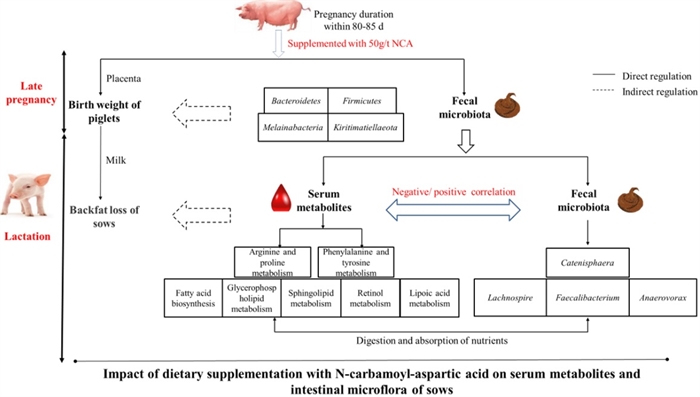Dietary Nucleotide Offers New Insight for Sows Breeding
Maternal nutrition status plays a vital role in the growth and development of the major fetal organ systems, and the fetal growth is dramatically increased during late gestation, and nutrient requirements of sows increase significantly in late gestation due to the rapid growth of the fetal-placental unit. As the most important factors of maternal nutrition, glucose, fatty acids, and amino acids are of great significance to the health and growth of the fetus. In addition, the fastest growing stage of foetal small intestine is during late pregnancy, and an impaired intestine in foetus can lead to a higher diarrhoea rate and lower growth performance after birth. Thus, promoting piglet health by regulating the nutrition of sows during late gestation and lactation is crucial for improving productive performance in the pig industry.
Recently, researchers from the Institute of Subtropical Agriculture, Chinese Academy of Sciences, systematically studied the feeding effects of dietary nucleotides in sows and discussed its mechanism of placental transport, nutrient metabolism, intestinal development, and other aspects. This team found that maternal nucleotide, pyrimidine nucleoside and uridine supplementation could regulate placental nutrient transport, largely in response to an alteration of mTORC1-PPAR signaling. Maternal nucleotide, pyrimidine nucleoside or uridine supplementation also regulates nucleotides, glucose, amino acids and fatty acids metabolism of neonatal piglets, thereby improving the reproductive performance of sow to a certain extent. Moreover, maternal nucleotide and uridine supplementation also contributed to reducing incidence of diarrhea by regulating cytokine secretion and intestinal mucosal barrier function in neonatal and suckling piglets, thereby improving weaning weight of the litter of suckling piglets. Furthermore, as a critical precursor for de novo biosynthesis of pyrimidine nucleotides, N-Carbamoyl-aspartic acid supplementation regulated intestinal microbial composition of sows and serum differential metabolites related to arginine, proline, phenylalanine, tyrosine, and fatty acids metabolism that may contribute to regulating the backfat loss of sows, and the birth weight and diarrhea rate of piglets. These findings provide a theoretical basis and technical support for the rational application of nucleotide in sows breeding.
These research results have been published in Animal Nutrition, Journal of the Science of Food and Agriculture, and British Journal of Nutrition.
The present study was supported by grants from the National Key R&D Program of China (2018YFD0501003), National key R&D program of China (2021YFD1301002) and the Tianjin Synthetic Biotechnology Innovation Capacity Improvement Project (TSBICIP-CXRC-031), and China Agriculture Research System (CARS-35).
More details could be found at https://doi.org/10.1016/j.aninu.2020.06.009, https://doi.org/10.1016/j.aninu.2022.07.011, https://doi.org/10.1002/jsfa.12186, https://doi.org/10.1002/jsfa.11037, https://doi.org/10.1002/jsfa.10410, https://doi.org/10.1017/S0007114520003165.
Contact: Lu-min Gao
E-mail: gao-lumin@foxmail.com
Institute of Subtropical Agriculture, Chinese Academy of Sciences

Figure. Impact of Dietary Supplementation with N-carbamoyl-aspartic Acid on Serum Metabolites and Intestinal Microflora of Sows.(Image by Lumin Gao)
Download attachments: